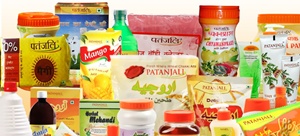Patanjali the most disruptive brand of 2016, says study
31 Dec 2016
Patanjali Ayurveda, with its generic products has turned out to be the most disruptive force in the fast-moving consumer goods market in India in 2016, challenging established brands with projected sales of $1 billion (Rs68,000 crore) by 2020, says an Assocham-TechSci Research paper.

Patanjali Ayurveda, steered by yoga guru Ramdev, has expanded its product portfolio across a range of personal care and food and beverages products recording annual growth rate of 146 per cent in fiscal 2016, with a turnover of around Rs5,000 crore ($769 million) while established companies, including ITC, Dabur, Hindustan Unilever, Colgate-Palmolive and Procter and Gamble, among others, struggled to get growth rates in double-digits or less.
''Patanjali Ayurveda has turned out to be the most disruptive force in the Indian FMCG market. Initially the company focused only on the development of Ayurvedic medicines but gradually started manufacturing food items and cosmetics''. Its products are available in 15,000 exclusive retail outlets, 3,000 Patanjali chikitsalaya kendras and retail chains such as Big Bazaar, Reliance Fresh etc.
''With around 500 products, many of them in FMCG category, the company has significantly increased its market share. Many of its product launches have impacted share of other FMCG companies in that product category. Some of its flagship brands which have wrested the market share of its competitors include Dant Kranti, Atta noodles and Kesh Kranti'', the paper said.
Patanjali Ayurveda Limited is owned to the extent of 94 per cent by Acharya Bal Krishna, a close disciple of Baba Ramdev.
The remaining share is held by a small group of individuals.
''Like in several other areas the Indian FMCG is also witnessing its disruptive moments. Interestingly the big disruption has come about from unconventional ownership. Yet another interesting aspect is that unlike a few years ago the focus has shifted away from the foreign direct investment in multi brand retail to home grown Ayurveda. This also reflects a kind of latent desire among the Indian consumers to adopt the products which are safe, healthy and free from side-effects'', said Assocham secretary general DS Rawat.
In 2015, the total Indian FMCG market was $43 billion of which 60 per cent is concentrated in urban areas and the rest in the rural areas. As much as 91 per cent of the retail trade in the sector is in the unorganised segment in contrast to the developed countries.
The paper said India is also emerging as a strong regional export hub for the domestic and multinational FMCG players leveraging the countries cost competitiveness.
''With growing disposable incomes, middle and upper middle class consumers in urban areas have shifted their purchasing trends from essential to premium products. The premium brands are manufacturing smaller packs or products and in response the firms have begun enhancing their top end product portfolios. The FMCG sector is also riding on the fast growth in e-commerce helped by the entire digital initiative being rolled out.''


















